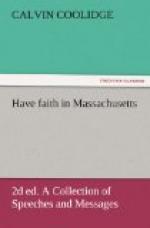XV
AMHERST ALUMNI DINNER, SPRINGFIELD
MARCH 15, 1918
The individual may not require the higher institutions of learning, but society does. Without them civilization as we know it would fall from mankind in a night. They minister not alone to their own students, they minister to all humanity.
It is this same ancient spirit which, coming to the defence of the Nation, has in this new day of peril made nearly every college campus a training field for military service, and again sent graduate and undergraduate into the fighting forces of our country. They are demonstrating again that they are the strongholds of ordered liberty and individual freedom. This has ever been the distinguishing characteristic of the American institution of learning. They have believed in democracy because they believed in the nobility of man; they have served society because they have looked upon the possession of learning not as conferring a privilege but as laying on a duty. They have taught and practised the precept that the greater man’s power the greater his obligation. The supreme choice is righteousness. It is that “moral power” to which Professor Tyler referred as the great contribution of college men to the cause of the Union.
The Nation is taking a military census, it is thinking now in terms of armament. The officers of government are discussing manpower, transportation by land and sea and through the air, the production of rifles, artillery, and explosives, the raising of money by loans and taxation. The Nation ought to be most mightily engaged in this work. It must put every ounce of its resources into the production and organization of its material power. But these are to a degree but the outward manifestations of something yet more important. The ultimate result of all wars and of this war has been and will be determined by the moral power of the nations engaged. On that will depend whether armies “ray out darkness” or are the source of light and life and liberty. Without the support of the moral power of the Nation armies will prove useless, without a moral victory, whatever the fortunes of the battlefield, there can be no abiding peace.
Whatever the difficulties of an exact definition may be the manifestations of moral power are not difficult to recognize. The life of America is rich with such examples. It has been predominant here. It established thirteen colonies which were to a large degree self-sustaining and self-governing. They fought and won a revolutionary war. What manner of men they were, what was the character of their leadership, was attested only in part by Saratoga and Yorktown. Washington had displayed great power on many fields of battle, the colonists had suffered long and endured to the end, but the glory of military power fades away beside the picture of the victorious general, returning his commission to the representatives of a people who would have made him king, and retiring after two terms from the Presidency which he could have held for life, and the picture of a war-worn people turning from debt, disorder, almost anarchy, not to division, not to despotism, but to national unity under the ordered liberty of the Federal Constitution.




